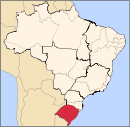Arambaré
Appearance
Arambaré | |
|---|---|
 Beach in Arambaré | |
| Nickname: Capital das Figueiras | |
 | |
| Coordinates: 30°54′54″S 51°29′52″W / 30.91500°S 51.49778°W | |
| Country | Brazil |
| State | Rio Grande do Sul |
| Mesoregion | Metropolitana de Porto Alegre[1] |
| Microregion | Camaquã[1] |
| Founded | March 20, 1992 |
| Government | |
| • Mayor | Joselena Maria Becker Scherer (PDT) |
| Area | |
• Total | 519.124 km2 (200.435 sq mi) |
| Elevation | 5 m (16 ft) |
| Population (2020 [2]) | |
• Total | 3,562 |
| • Density | 6.9/km2 (18/sq mi) |
| Time zone | UTC−3 (BRT) |
| HDI | 0.743[3] |
| GDP | R$ 39,253,000[4] |
| GDP per capita | R$8,770.00 |
Arambaré (Portuguese: [a.ɾɐ̃.baˈɾɛ] ) is a municipality in the state of Rio Grande do Sul, Brazil. It is bordered by Tapes on the north, Camaquã on the west and south, and Lagoa dos Patos on the east. It is at km 396 of the BR-116, 33 km from Camaquã. It is 156 km from Porto Alegre.
Arambaré, in Guarani, means "priest who shines light." Its origin was the Tape people, who populated the Lagoa dos Patos coast. Later the place was known as Barra do Velhaco and Paraguaçu. Dunas da Lua de Natal and Prainha are two of the baths found in the city.
In summer, tourism is the most important industry. The rural area is known for its rice and livestock.
The city is well known for its Carnaval, when thousands of tourists visit.
See also
[edit]References
[edit]- ^ a b "Divisão Territorial do Brasil". Divisão Territorial do Brasil e Limites Territoriais. Instituto Brasileiro de Geografia e Estatística (IBGE). 1 July 2008. Retrieved 11 October 2008.
- ^ IBGE 2020
- ^ "Ranking decrescente do IDH-M dos municípios do Brasil". Atlas do Desenvolvimento Humano. Programa das Nações Unidas para o Desenvolvimento (PNUD). 2000. Archived from the original on 3 October 2009. Retrieved 11 October 2008.
- ^ "Produto Interno Bruto dos Municípios 2002-2005" (PDF). Instituto Brasileiro de Geografia e Estatística (IBGE). 19 December 2007. Archived from the original (PDF) on 2 October 2008. Retrieved 11 October 2008.




